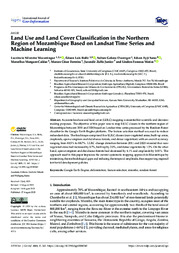Land use and land cover classification in the northern region of Mozambique based on Landsat time series and machine learning.
Land use and land cover classification in the northern region of Mozambique based on Landsat time series and machine learning.
Author(s): MACARRINGUE, L. S.; BOLFE, E. L.; DUVERGER, S. G.; SANO, E. E.; CALDAS, M. M.; FERREIRA, M. C.; ZULLO JUNIOR, J.; MATIAS, L. F.
Summary: Accurate land use and land cover (LULC) mapping is essential for scientific and decision-making purposes. The objective of this paper was to map LULC classes in the northern region of Mozambique between 2011 and 2020 based on Landsat time series processed by the Random Forest classifier in the Google Earth Engine platform. The feature selection method was used to reduce redundant data. The final maps comprised five LULC classes (non-vegetated areas, built-up areas, croplands, open evergreen and deciduous forests, and dense vegetation) with an overall accuracy ranging from 80.5% to 88.7%. LULC change detection between 2011 and 2020 revealed that non-vegetated areas had increased by 0.7%, built-up by 2.0%, and dense vegetation by 1.3%. On the other hand, open evergreen and deciduous forests had decreased by 4.1% and croplands by 0.01%. The approach used in this paper improves the current systematic mapping approach in Mozambique by minimizing the methodological gaps and reducing the temporal amplitude, thus supporting regional territorial development policies.
Publication year: 2023
Types of publication: Journal article
Observation
Some of Embrapa's publications are published as ePub files. To read them, use or download one of the following free software options to your computer or mobile device. Android: Google Play Books; IOS: iBooks; Windows and Linux: Calibre.
Access other publications
Access the Agricultural Research Database (BDPA) to consult Embrapa's full library collection and records.
Visit Embrapa Bookstore to purchase books and other publications sold by Embrapa.

